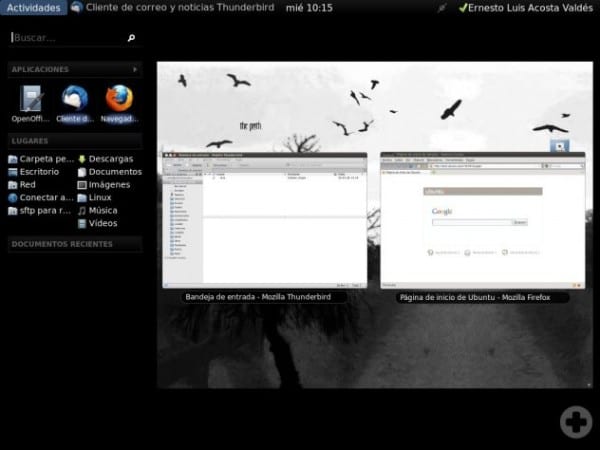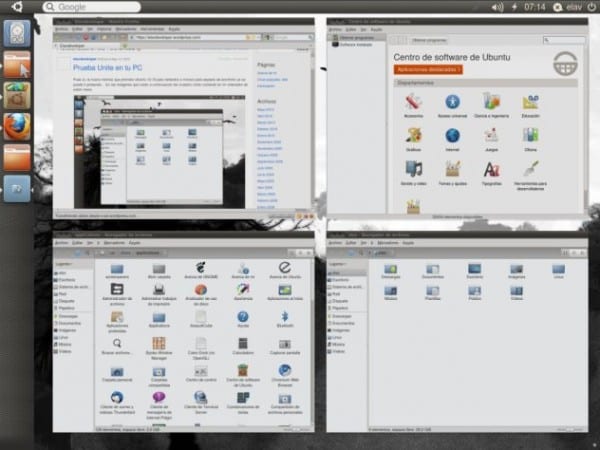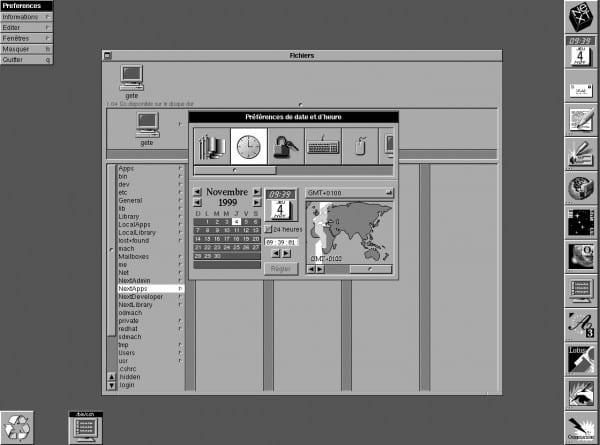Well what a problem has been armed in G + between developers, users, and even the own Mark Shuttleworth, all to defend / criticize what Mir represents for the future of Ubuntu.
Summarizing the entire debate is an arduous task, it is best that everyone visit the link and find out everything they talked about. What did catch my attention is that according to Mark Shuttleworth, Unity exists first that Gnome Shell. And I quote verbatim:
Unity existed before Gnome Shell. And the design of Unity was clear up front, it's Red Hat's team that wandered all over the place before shifting to a design that bears a startling resemblance to Unity.
However, a few comments below a user named Mathias Hasselman comments:
+David James +Mark Shuttleworth You really must get better at checking facts:
https://git.gnome.org/browse/gnome-shell/commit/?id=4ba985b4844b7efeed1c64276759aa2632b86472
date: 2008-10-31 04:22:44 (GMT)http://bazaar.launchpad.net/~unity-team/unity/trunk/revision/1 date: 2009-10-15 10:40:35 UTC
Pointing that out, despite loving Unity. Also I believe to remember that Canonical was actively involved with the initial UI mock-ups of GNOME Shell, let me check GNOME mailing list archives.
And as some would say, mathematics is not wrong: Gnome Shell had been in development, at least on Git servers, a year ahead of Unity.
Doing a bit of memory, I remember that Gnome Shell initially it didn't look like now, it was a bit different as we can see in the following image:
y Unity It also had its differences from the current version, but to a lesser degree:
Also, it would be a lot of cheek to Mark Shuttleworth pretend that Unity is something novel or unique, when many of us know that it is nothing more than a modern copy of NextStep. Does anyone else see the resemblance?
So I wonder who is right? I don't know, but I strongly agree with the comment made by Jono bacon, developer of Ubuntu:
Threads like this are an example of why Open Source struggles in places; technological cat-fights that do nothing more than stir up bad blood.
These "open" debates, although they teach and show us each other's points of view, also demoralizes the Open Source Community a bit. Mir vs. Wayland has become part of the classic flamewar of always: Gnome vs. KDE, Qt vs. Gkt, etc ... and apparently, we will never be able to agree.
I would ask Mark What difference does it make who was there first? The important thing is that both are there, and both gather enough users and developers to keep both projects alive, that if I am honest, I do not think that the two together exceed in work and effort to KDE....



To be honest, I don't really care who came out first. I have used KDE and I do not like it very much but I am not an expert on this either and, as they say, "for taste, colors. What I do agree with is Jono Bacon's comment as well. Since I've been using GNU / Linux I've seen all kinds of discussions. At first they entertained and it was good to troll some but the truth is that it already tires ...
This kind of thing should be true of proprietary software as well. What happens is that we do not find out: p
No, if at this rate we are going to have to agree with Icaza a bit ...
As you say it is another flamewar, and when both are ready to be used daily I will try them. That I am not convinced or that the Nvidia drivers give problems (because at the moment there are no peels to catch an Intel board, at least in the immediate future), because I will continue with Xorg and that's it, and as Darko says, for tastes , the colors.
I think that in Ubuntu they are beginning to believe a lot, as they think that they can do everything alone, let's see if it is true.
It is not for defending Ubuntu, but it is that they can afford to believe it; the task that they are carrying out is monumental, the way to boost Linux is far greater than what any other distro is doing, without underestimating any of them, of course.
I quote:… that if I'm honest, I don't think the two together surpass KDE in work and effort….
That is adding fuel to the fire, clearly this post will be another flamewar xD
It's not putting together a flamewar, it's just my appreciation. As I myself cannot say that the development of Xfce involves the effort and work that is needed for Unity or Gnome Shell, I cannot say that Unity and Gnome Shell entail the effort and work that is needed in KDE. They are projects that differ in size. KDE has a lot more tools and applications than Unity, Gnome Shell, and Xfce put together .. that's why I'm saying it, not because one is better or worse than the other ..
But KDE is a Software Compilation. The others are ams desktops
elav, your comment will not be flamboyant, but the truth was not to speak of KDE. It's like making an article from an rpm distro and closing with an opinion that deb are better, or making one from a distro and closing with that it is not stable like Debian, etc.
Isn't Debian overrated, now that the comment is out? A distro that uses old software is normal for it to be stable.
I don't know why but I can't quite see the grace of Debian.
It is useful in some cases (mainly servers) but I don't know if they are my thing or I feel that the system runs slower compared to other distros and the same packages installed ...
Joules
Debian's stability is not based on the versions of its software, but rather on the attention they pay to finding and addressing bugs.
The policy that Debian has has its pros and cons as well as that of Fedora or Arch to get everything new as soon as possible, and everyone can choose according to their tastes. I don't think Debian is overrated, as I do think Ubuntu is underrated.
I personally do not need to use the newest software (I can be like with an Ubuntu LTS), but I also do not like the versionitis that you are forced to enter sometimes when you use distros like Fedora, which you should use if or if the newer software they have and they don't give you the option to switch to a newer version whenever you want like in a rolling release. (Well, it can be done with power, but I mean that you have the option to do it without having to grab a console to freeze software versions of your operating system)
If I am not mistaken from what I have read, Gnome Shell started development a year before Unity, but Unity was released a year before Gnome Shell (a version for netbooks.
I do not know if it is true or they have cast it on me.
GNOME Shell was conceived earlier but had a longer gestation. So long that what was to be a wildebeest, an elephant was born.
Just what a certain Velimir Baxa says:
Offtopic: how do you get out the "quote" style when you write a comment?
I use the [blockquote] [/ blockquote] tags but not with brackets, but with the signs of greater and less than ..
I tried both ubuntu as well as gnome shell and xfce, my conclusion is the following they do not match what KDE provides (calligra, krita, karbon, rekonq, amarok and a huge etc.)
For work reasons I am on a windows system and it is really strange to be in KDE.
regards
It's missed?.
In my opinion, KDE is quite similar to Windows in terms of the visual aspect of its desktop.
But anyway, as some comments above said, to taste the colors ..
Every desktop with a bar, a menu and windows, looks like windows. You have discovered the Indies xd
That Plasma Desktop is shown by default as a Windows does not prevent you from missing it. Plasma can look like Unity, GNOME Shell or a Mac OS but its appearance is not its main virtue. You would like Windows to "functionally" look like KDE. And if we look at the applications ... Where is KRunner? Dolphin? K3b? Okular? Gwenview ?, ... Windows needs third-party tools to have similar functionality.
Having KDE and making it look like Gnome Shell isn't that silly? For that use Gnome Shell and enjoy !!!!!
Do not believe it. You may like the GNOME Shell layout but at the same time you don't support certain environment constraints. With Plasma you can make a hybrid to your measure.
i know that feel bro ..
I'm just in college ...
And yes then, KDE has more developers, more community, it is more of an ecosystem ...
gnome is good and unity too and it is important to have options to choose from (on my laptop I use gnome 2.32 on gentoo) but they still do not reach the KDE level, also lately gnome is more oriented to touch devices as well as we have to name some Fluxbox, Openbox, Lxde oriented to machines with few resources…. the point is that diversity is good ... let's not try to say which is better or worse, the important thing is that they are there for every situation that requires the use of a desk like that….
Does it matter which came first? The same unity is a copy of osx, and gnome-shell brings out green gray hair from linux veterans, there will always be detractors and fans of both, what we can say is superfluous, linux is great and there is for everyone, and most importantly It is universal law, "everything is a copy of everything" that and even if you lock yourself in a bunker without access to the outside programs, your environment when you leave they will tell you that it is a copy X, so by my bla bla bla with this flamewar!
http://kcy.me/gy6y
Mark now only remains to say "we are not the first but we will be the best" and that is the end of the discussion> +>
I don't think this is a "holy war", wayland is a step up from X, there is no reason, REALLY NONE, to create a new graphical server that goes against all the flow that was being seen in GNU / Linux ... if there is more development in Mir, it will affect wayland a lot, due to the drivers and support issue with the entire graphic issue ... It is already a lot of work to port everything to wayland, the problem with 2 graphic servers will be much greater new…
Ubuntu should support and help wayland, but using that other graphical server makes no sense, there are no excuses…. Unless they want to do something that wayland can't and they don't want to tell us, BUT that is not the way to work in the world of free software, it is not the way at all.
I prefer David Edelsohn's comment:
We may agree or not, but free software licenses allow Ubuntu to do what it is doing, regardless of whether it is correct or not.
Mark's reply was not the brightest, but as Linus Torvalds once said, the success of free software is because of selfishness, you contribute either because of a challenge, as a hobby, or because you require certain functionalities.
And on KDE I agree. It has many things.
+1
I agree with you, there is a lot of selfishness in this area!
This post is very silly !!! What came first? The nonsense or this post.
And let's thank God that this post is not "a personal opinion" (like most lately), please, the community needs to mature, this is very childish.
What came first? The nonsense or this post.
elav
Once upon a time, when users and readers of DesdeLinux They were more polite and there were no trolls. Good 'ol times..
Shuttleworth is taking Apple's marketing policy in some things, one of those Unity, personally I don't like that propaganda policy, but as a user I like the path it is taking in Ubuntu and the changes it intends (or will make) .
And if we go to the concept of the idea, it is clear that the Gnome group are the ones who made and developed it (the same history of Canonical shows us that they do not innovate much but adapt what is in the market to their needs) , and just look at each release of Gnome Unity libraries also change version.
And on the other hand, if we go to the cutting edge of marketing that whoever brings something to the market first is awarded the achievement, because in that case Canonical is the one who takes the cake.
Well Ubuntu came out from the Ubuntu Netbook Launcher, which was the interface designed for Netbooks, and since then it had already handled various concepts used in Gnome Shell and Unity, such as the dash with the application icons, from there the Unity idea later. I think that the main reason for creating Unity was that Canonical did not agree with the changes that were brewing for Gnome Shell and their interest in creating an interface designed for Widescreen screens, at the time netbooks, tablets were very famous They were not yet in the boom, but they were already thinking of futuristic interfaces different from the traditional ones, already thinking of touch devices.
Diversity is good, even healthy competition, I remember a post by Shuttlworth on his blog where he criticized the actions of GNOME (where Red Hat has great influence) of not admitting the proposed changes that Canonical was proposing, because among other things, those The changes would help better reuse Gnome core components when making a different shell and he was telling them that healthy competition should be welcome.
Something similar happened now that it was finally important for Canonical to decide the implementation of Mir.
In the end the code of Unity, Mir, Ubuntu Touch, etc. is open, there is no impediment to be reused by others. I don't know why many say that Ubuntu is closed, etc, etc, I have done everything in Launchpad where they have treated me very well, people are very attentive and open to collaboration.
What happens is that those who are already used to criticizing Ubuntu will continue to do so without really contributing anything to Ubuntu itself.
Be more open-minded friends. Do not close.
Greetings all.
If I remember correctly there was a Ubuntu disitro for netbook oriented (NetBook Remix Desktop) that had a unity-like desktop and from which gnome-shell has probably taken some idea.
I also understand that unity started as a gnome-shell modification derived from a canonical fight with the gnome developers because they only listened to the opinions of redhat who was the one who put the money.
Of the people who participate in these types of areas, the vast majority express their dislike for both gnome-shell and unity (I suppose we are a public with more than a year old in linux). The paradox of the matter is that most of the people who have nothing to do with the Linux world are delighted with the innovation that these two desktops represent.
That's true. Many people outside the Linux world are dazzled by these new desktops; and to the tests of what I install people I refer. I have been a user for many years, and I do value Gnome-Shell quite positively. Yes; I admit that "standard" is very poor; what happens is that with a few extensions, you can have something fantastic and very functional. I understand that an absolutely key issue in Gnome-Shell is the potential of your website with extensions. There really are great ones. Every time I install it, I don't put less than 10 or 12 extensions.
KDE? No thanks, I did without Windows for simplicity, not to go to something more complicated and heavy. I stay with my dear Gnome-Shell.
Other .. Same question I always ask. How long have you not tried KDE?
Hehehe, it was just a troll comment.
Linux discussions ...